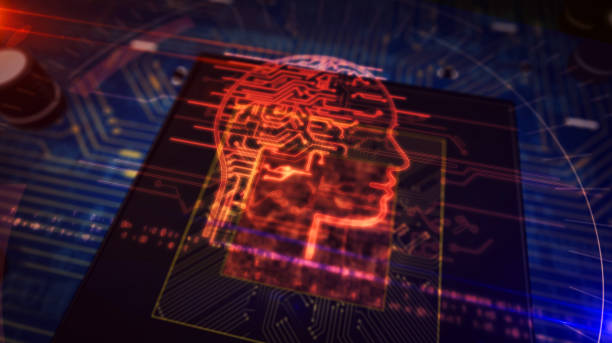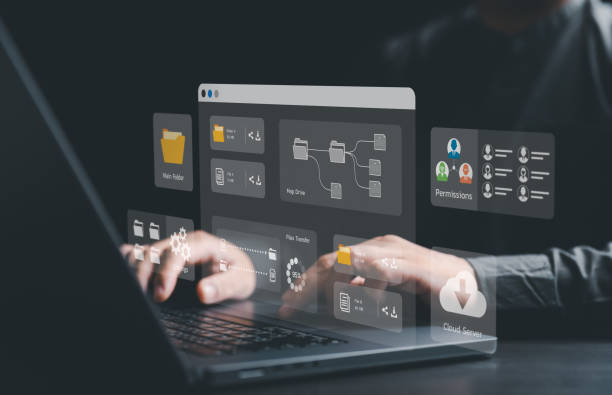Introduction to the Era of Mobile AI Applications
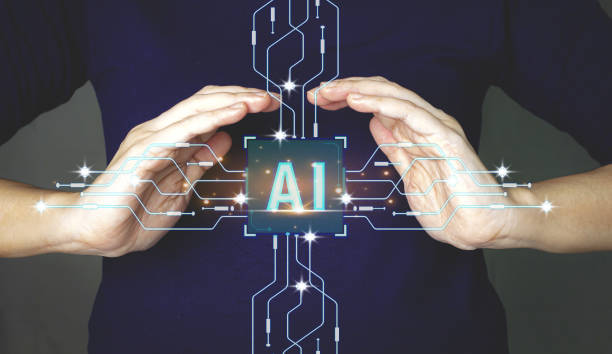
In today’s world, the boundary between technology and daily life has blurred more than ever.
The emergence of #Mobile_AI_Applications marks a turning point in this convergence, making advanced artificial intelligence capabilities accessible in the palm of everyone’s hand.
These applications are no longer merely tools for simple tasks; instead, they have transformed into intelligent assistants that can learn, analyze, and even provide predictions.
From facial recognition and real-time translation to advanced photo editors and voice assistants, we witness new innovations developing in this field every day.
These applications, utilizing complex machine learning algorithms and cloud processing, are capable of processing vast amounts of data in real-time and delivering completely personalized user experiences.
The main goal of this introduction is to provide an overview of the importance and role of this technology in the current era and how it is changing our approach to interacting with smart devices.
Are you frustrated with your online store’s low conversion rate?
Rasaweb, with its professional e-commerce website design, is your definitive solution!
✅ Increase your sales and revenue
✅ Unparalleled user experience for your customers
⚡ Get a free consultation right now!
The Evolution of Mobile AI Applications: From Past to Present
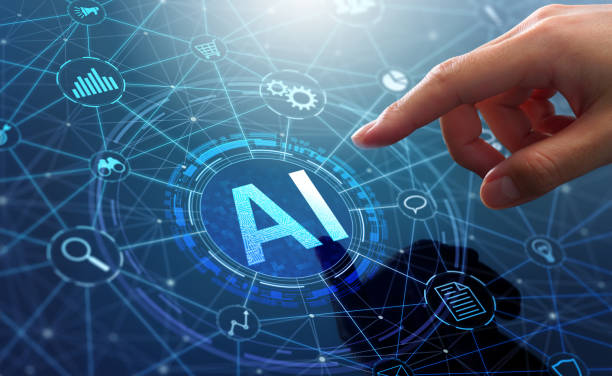
The history of AI in mobile isn’t as long as that of smartphones themselves, but its pace of advancement has been astonishing.
Initially, mobile AI applications were mostly known as simple tools for improving camera performance or suggesting words on the keyboard.
However, over time and with significant advancements in mobile processing power, as well as the development of deep neural networks, their capabilities have expanded increasingly.
From voice assistants like Siri and Google Assistant that can understand and execute complex commands, to apps that transform your face into a painting using AI, all demonstrate this evolution.
This progression is not only technically remarkable but also highly significant in terms of changing #lifestyle and user expectations from technology.
Cloud platforms have also played a vital role in this evolution, allowing applications to offload heavy processing tasks to powerful servers and quickly return the results to the device.
This combination of Edge AI and #Cloud_Computing has opened up limitless potential for the future of these applications.
Foundational Technologies in Mobile AI Applications
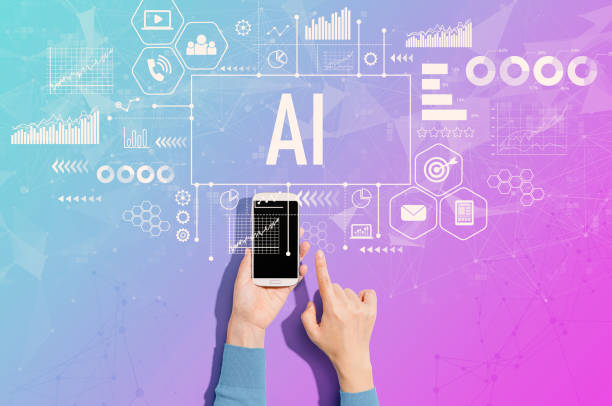
Mobile AI applications are built upon a set of advanced technologies that enable them to perform complex tasks with high accuracy and speed.
The core of these applications is #Machine_Learning and, in particular, #Deep_Learning.
These algorithms allow programs to learn from data and improve their performance without explicit programming.
For instance, in image recognition applications, deep neural networks analyze millions of images to identify patterns and are capable of recognizing objects, faces, or even emotions.
Furthermore, #Natural_Language_Processing (Natural Language Processing – NLP) plays a vital role in understanding and generating human language, which is clearly seen in voice assistants, translators, and chatbots.
Alongside these, the use of specialized hardware such as NPU (Neural Processing Unit) chips in new smartphones has made local AI processing possible with less power consumption.
These advancements allow mobile AI applications to function intelligently even in the absence of an internet connection, providing a unique user experience.
| AI Technology | Brief Description | Example of Application in Mobile App |
|---|---|---|
| Machine Learning (ML) | Algorithms that enable systems to learn from data without explicit programming. | Content recommendations in video streaming apps, spam detection in emails. |
| Deep Learning (DL) | A subset of ML that uses neural networks with multiple layers to learn complex patterns. | Facial recognition, image processing, advanced machine translation. |
| Natural Language Processing (NLP) | The ability of computers to understand, interpret, and generate human language. | Voice assistants, chatbots, text summarization, sentiment analysis. |
| Computer Vision | The ability of computers to recognize and process images and videos. | Adding filters to images, object detection in cameras, document scanning. |
| Edge AI | Processing AI data locally on the device, instead of sending it to the cloud. | Face unlock, real-time image processing in camera, offline keyboard suggestions. |
Amazing Benefits of AI Applications in Daily Life

Mobile AI applications are not just an emerging technology; they have become an integral part of modern life.
One of their greatest advantages is the personalization of user experiences.
By analyzing your behavior and preferences, these applications suggest content, products, or services that precisely match your needs.
This level of personalization increases productivity and saves time.
In the field of #health, there are applications that monitor physical activities and sleep patterns, helping you to lead a healthier lifestyle.
In #education, they can provide personalized curricula and identify students’ strengths and weaknesses.
Even in #financial_management, these applications analyze your spending habits, making budgeting easier and helping you save.
The ease of access and portability of smartphones have made these advanced technologies available anytime, anywhere, acting as a #smart and ever-present #guide.
Are you tired of your e-commerce website not generating as much revenue as it could? Rasaweb, specializing in professional e-commerce website design, solves this problem permanently!
✅ Increase sales rate and revenue
✅ High loading speed and unparalleled user experience
⚡ Get a free e-commerce website design consultation
Educational and Productivity Applications of Mobile AI
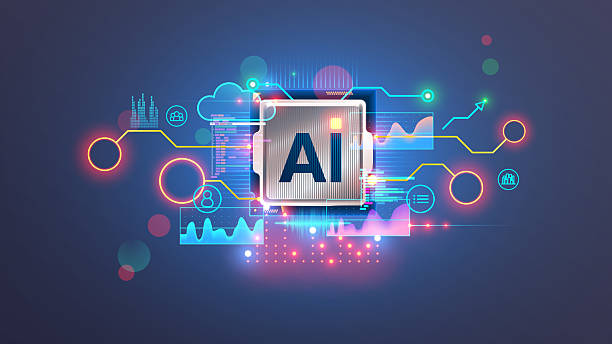
Mobile AI applications have brought about significant transformations in education and productivity enhancement.
In the #educational sector, these applications have become powerful learning tools.
For example, AI-powered applications that teach foreign languages not only teach words and grammar but also provide real-time feedback by detecting accents and speech errors.
These features of personalized_learning help students and learners progress at their own pace and method.
In terms of productivity, AI assistants can schedule your meetings, summarize emails, or even draft texts for you.
Note-taking applications with AI capabilities can convert handwritten notes into digital text or extract key points from lectures.
This kind of #expertise and #guidance provided by AI helps individuals manage their time better and focus on more important tasks.
Their analytical capabilities play a significant role in information organization and #task_management, contributing to the improvement of individuals’ quality of life.
Entertaining and Creative Mobile AI Applications
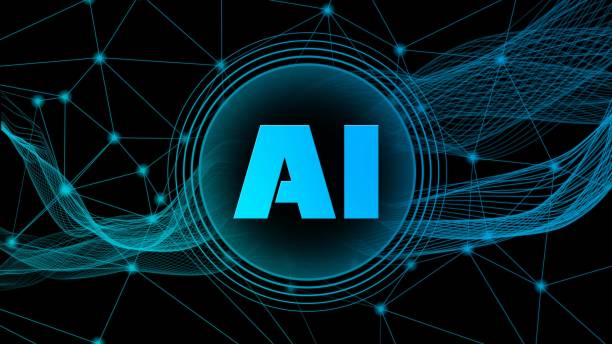
In addition to serious applications, mobile AI applications also have a strong presence in the field of #entertainment and creativity, offering unique user experiences.
Photo and video editing apps that utilize AI can transform your images into works of art, change backgrounds, or even make faces appear younger or older.
These tools, using #Generative_Adversarial_Networks (GANs), provide ordinary users with astonishing capabilities that were previously only achievable by graphic specialists.
AI-powered music creation apps are capable of composing melodies and even fully arranging songs, giving anyone the opportunity to be a content creator without deep musical knowledge.
Furthermore, mobile games that use AI to create smarter non-player characters (NPCs) or dynamic challenges offer a more #thought-provoking and #engaging experience.
These creative and #entertaining applications not only push the boundaries of art and technology but also enable users to express their creativity in new ways with smart tools and use their time in a #creative and #enjoyable manner.
Challenges and Limitations of Mobile AI Applications

Despite all the advantages and advancements, mobile AI applications also face challenges and limitations that must be considered for a complete understanding of this technology.
One of the most important issues is #privacy and #data_security.
Many of these applications require access to a large volume of personal data to function correctly, raising concerns about how they are collected, stored, and used.
High battery consumption is another limitation, as AI processing, especially when using NPU chips or constant communication with cloud servers, can quickly drain phone battery.
The issue of #AI_bias is also a serious ethical challenge; if the training data for algorithms contain bias, the results from the application can also be unfair or discriminatory.
Furthermore, dependence on internet connection for many advanced features limits accessibility in areas with poor coverage.
This #thought-provoking #content requires #specialized approaches to solve these issues so that this technology can realize its full potential.
| Challenge | Explanation | Potential Solutions |
|---|---|---|
| Privacy and Data Security | Need to collect and process large volumes of personal data, risk of data breaches. | Data encryption, Federated Learning, on-device local processing (Edge AI). |
| High Battery Consumption | Heavy AI processing operations lead to rapid battery drain. | Algorithm optimization, use of dedicated NPU hardware, intelligent cloud processing. |
| Bias in Algorithms | Unbalanced training data leads to unfair or discriminatory results. | Diversifying training data, continuous auditing and evaluation of algorithms, AI transparency. |
| Hardware Limitations | Limited processing power and memory of smartphones. | Model compression, model optimization for mobile processors, combination of local and cloud processing. |
| Dependence on Internet Connection | Many advanced features require a stable connection to the cloud. | Development of lighter AI models for offline execution, improvement of Edge AI performance. |
Future Trends and New Horizons for Mobile AI Applications
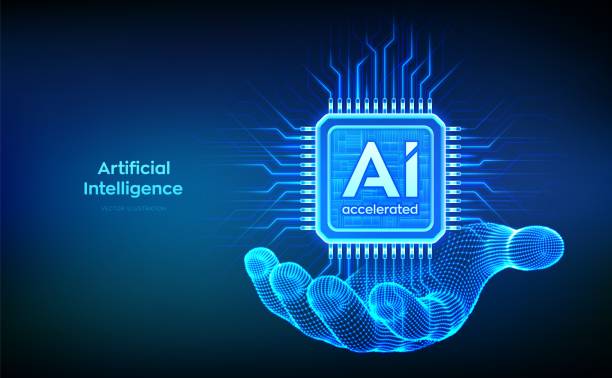
The future of mobile AI applications is very bright and full of unparalleled potential.
One of the most important future trends is the expansion of #Edge_AI.
This means that a larger portion of AI processing will be performed directly on the mobile device itself, not in the cloud.
This not only increases speed and reduces latency but also improves privacy issues, as data does not need to leave the device.
Personalized AI assistants will also advance, evolving from merely responding to commands to anticipating user needs and performing more complex tasks without direct requests.
Augmented Reality (AR) and Virtual Reality (VR) will also offer entirely new user experiences with deeper integration with AI.
These convergences enable a deeper #analysis of the environment and user interactions, allowing these applications to interact more intelligently with our physical surroundings.
These #news and #trends indicate that we are on the verge of entering an era where our smartphones will increasingly become #intelligent and #autonomous companions.
Do you know that customers’ first impression of your company is your website? Multiply your business’s credibility with a powerful corporate website from Rasaweb!
✅ Custom and eye-catching design tailored to your brand
✅ Improved user experience and increased customer acquisition
⚡ Get a free consultation!
Guide to Choosing the Right Mobile AI Application
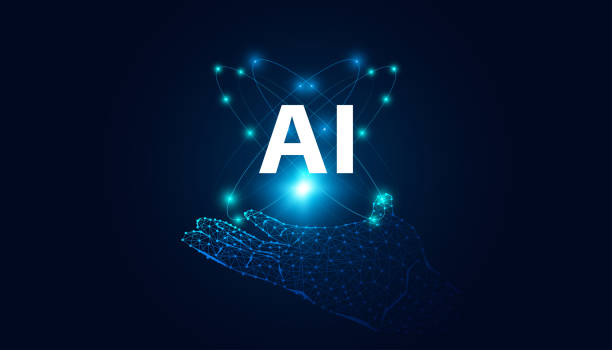
Given the increasing variety of mobile AI applications on the market, choosing the best option that suits your needs can seem difficult.
This section serves as a comprehensive #guide for selecting the right application.
First, identify your needs.
Are you looking for an #educational tool, or an app for #entertainment and creativity? Or perhaps your goal is to increase #productivity and #expertise? Then, pay attention to the developer’s reputation and user reviews.
Checking #ratings and user_reviews can give you a good insight into the app’s performance and reliability.
Privacy and data security are also of high importance; review the app’s privacy policies to ensure your data is properly protected.
Also, pay attention to battery consumption and storage space, especially if you are using a phone with mid-range hardware.
Some applications require monthly subscriptions or in-app purchases; make sure its business model aligns with your budget.
These considerations will help you make an informed choice and get the most out of your investment in these smart technologies.
The Impact of AI Applications on Daily Life and Society
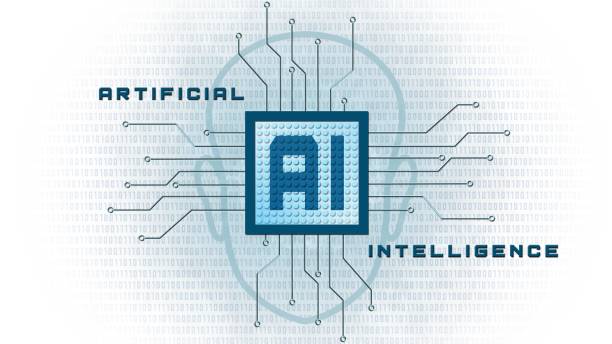
The impact of mobile AI applications on daily life and society extends beyond mere tools; they are changing how we work, learn, and interact with each other.
These applications assist individuals with special needs; for example, there are programs to help visually impaired people with navigation or reading texts.
In the #customer_service sector, AI chatbots in applications are available 24/7 and can quickly answer user questions or resolve their issues, leading to increased customer satisfaction.
In the field of #individual_creativity, these applications enable people to produce professional visual and audio content without needing complex skills.
From an #analytical perspective, by collecting behavioral data, these applications help companies and researchers better understand human patterns and offer improved services and products.
These impacts are generally positive, but ethical and social issues such as the digital_divide must also be considered to ensure that the benefits of this technology are accessible to everyone and do not lead to increased inequalities.
This is a comprehensive #explanation of the broad dimensions of this technology’s impact.
Frequently Asked Questions
| No. | Question | Answer |
|---|---|---|
| 1 | What is a mobile AI application? | A mobile AI application is a program that uses artificial intelligence capabilities (such as machine learning, natural language processing, computer vision) to provide smarter and more automated experiences on mobile devices. |
| 2 | Why is AI important in mobile applications? | Its importance is due to increased efficiency, personalization of user experience, task automation, improved decision-making, and the provision of innovative features such as facial recognition or voice assistants. |
| 3 | What are examples of mobile AI applications? | Voice assistants (e.g., Siri, Google Assistant), navigation apps with real-time traffic (Google Maps), image filters (Snapchat, Instagram), language translation apps, and facial recognition applications. |
| 4 | What challenges exist in developing mobile AI applications? | Hardware limitations of mobile devices (processing power, battery), need for large and high-quality data, user privacy protection, and the complexity of implementing AI models. |
| 5 | What is the role of machine learning in these applications? | Machine learning allows the application to learn from data, identify patterns, and improve its performance over time, such as in product recommendation systems or speech recognition. |
| 6 | Do mobile AI applications require an internet connection? | Many advanced AI capabilities require an internet connection and cloud processing, but some lighter models can also work “on-device” (without internet). |
| 7 | How does AI help improve the user experience on mobile? | By personalizing content, predicting user needs, automating repetitive tasks, and providing more natural user interfaces like voice commands. |
| 8 | What is the difference between cloud AI and on-device AI in mobile? | Cloud AI uses powerful servers for processing (requires internet), while on-device AI performs processing directly on the phone itself (does not require internet, but has processing limitations). |
| 9 | What will be the future of mobile AI applications? | We expect to see increased personalization capabilities, deeper integration with phone sensors, development of smarter assistants, and advancements in on-device processing. |
| 10 | Which frameworks are popular for AI development in mobile? | TensorFlow Lite (for Android and iOS), Core ML (for iOS), PyTorch Mobile are among the popular frameworks for implementing AI models in mobile applications. |
And other services from Rasaweb Advertising Agency in the field of advertising
Smart Custom Software: A combination of creativity and technology to analyze customer behavior using real data.
Smart Marketplace: An effective tool for analyzing customer behavior by customizing user experience.
Smart Sales Automation: A creative platform to improve sales growth by optimizing key pages.
Smart Brand Identity: An effective tool to increase click-through rates with attractive UI design.
Smart SEO: Designed for businesses looking to increase click-through rates through attractive UI design.
And over a hundred other services in the field of internet advertising, advertising consulting, and organizational solutions
Internet Advertising | Advertising Strategy | Advertorial
Resources
Comprehensive Review of Mobile AI Applications on Digikala MagDigital Revolution and Mobile AI on VirgoolComparison and Analysis of Mobile AI Applications on ZoomitUnderstanding the Impact of AI on the Mobile Industry on ISNA
?Rasaweb Afarin Digital Marketing Agency is your companion on the path to reaching the peaks of digital success. We transform your business with services such as modern UI website design, professional SEO, social media management, and content marketing.
📍 Tehran, Mirdamad Street, next to Bank Markazi, Southern Kazeroon Alley, Ramin Alley, No. 6

